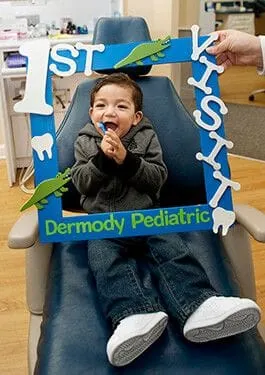When should I take my child to the dentist for the first check-up?
In order to prevent dental problems, your child should see a pediatric dentist when the first tooth appears, or no later than his/her first birthday.
What should I use to clean my baby's teeth?
A toothbrush will remove plaque bacteria that can lead to decay. Any soft-bristled toothbrush with a small head, preferably one designed specifically for infants, should be used at least twice a day.
What is the difference between a pediatric dentist and a family dentist?
Pediatric dentists are the pediatricians of dentistry. A pediatric dentist has two to three years specialty training following dental school and limits his/her practice to treating children only. Pediatric dentists are primary and specialty oral care providers for infants and children through adolescence, including those with special health needs.
Are baby teeth really important to my child?
Primary, or "baby" teeth are important for many reasons. Not only do they help children speak clearly and chew naturally, they also aid in forming a path that permanent teeth can follow when they are ready to erupt.
Are thumb sucking and pacifier habits harmful for a child's teeth?
Thumb and pacifier sucking habits will generally only become a problem if they go on for a very long period of time. Most children stop these habits on their own, but if they are still sucking their thumbs or fingers when the permanent teeth arrive, a mouth appliance may be recommended by your pediatric dentist.
How can I prevent decay caused by nursing?
Avoid nursing children to sleep or putting anything other than water in their bed-time bottle. Also, learn the proper way to brush and floss your child's teeth. Take your child to a pediatric dentist regularly to have his/her teeth and gums checked. The first dental visit should be scheduled by your child's first birthday.
How often does my child need to see the pediatric dentist?
A check-up every six months is recommended in order to prevent cavities and other dental problems. However, your pediatric dentist can tell you when and how often your child should visit based on their personal oral health.
Toothpaste: When should we begin using it and how much should we use?
Fluoridated toothpaste should be introduced when a child is 2-3 years of age. Prior to that, parents should clean the child's teeth with water and a soft-bristled toothbrush. When toothpaste is used after age 2-3, parents should supervise brushing and make sure the child uses no more than a pea-sized amount on the brush. Children should spit out and not swallow excess toothpaste after brushing.
How do dental sealants work?
Sealants work by filling in the crevices on the chewing surfaces of the teeth. This shuts out food particles that could get caught in the teeth, causing cavities. The application is fast and comfortable and can effectively protect teeth for many years.
How safe are dental x-rays?
There is very little risk in dental x-rays. Pediatric dentists are especially careful to limit the amount of radiation to which children are exposed. Lead aprons and high-speed film are used to ensure safety and minimize the amount of radiation.
How can parents help prevent tooth decay?
Parents should take their children to the dentist regularly, beginning with the eruption of the first tooth. Then, the dentist can recommend a specific program of brushing, flossing, and other treatments for parents to supervise and teach to their children. These home treatments, when added to regular dental visits and a balanced diet, will help give your child a lifetime of healthy habits.
How do I know if my child is getting enough fluoride?
Have your pediatric dentist evaluate the fluoride level of your child's primary source of drinking water. If your child is not getting enough fluoride internally through water (especially if the fluoride level is deficient or if your child drinks bottled water without fluoride), then your pediatric dentist will evaluate your total fluoride intake, and make suggestions for your specific needs.

